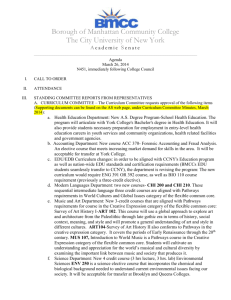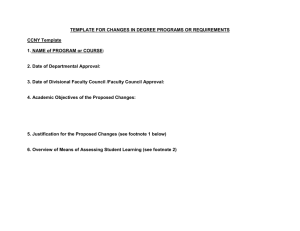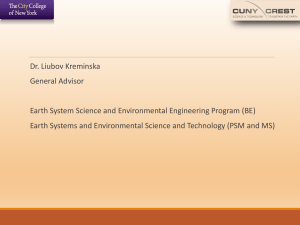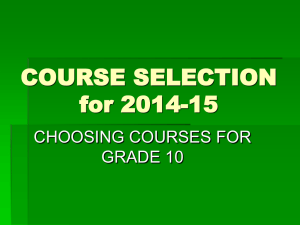ASAgenda4.23.2014 - Borough of Manhattan Community College
advertisement
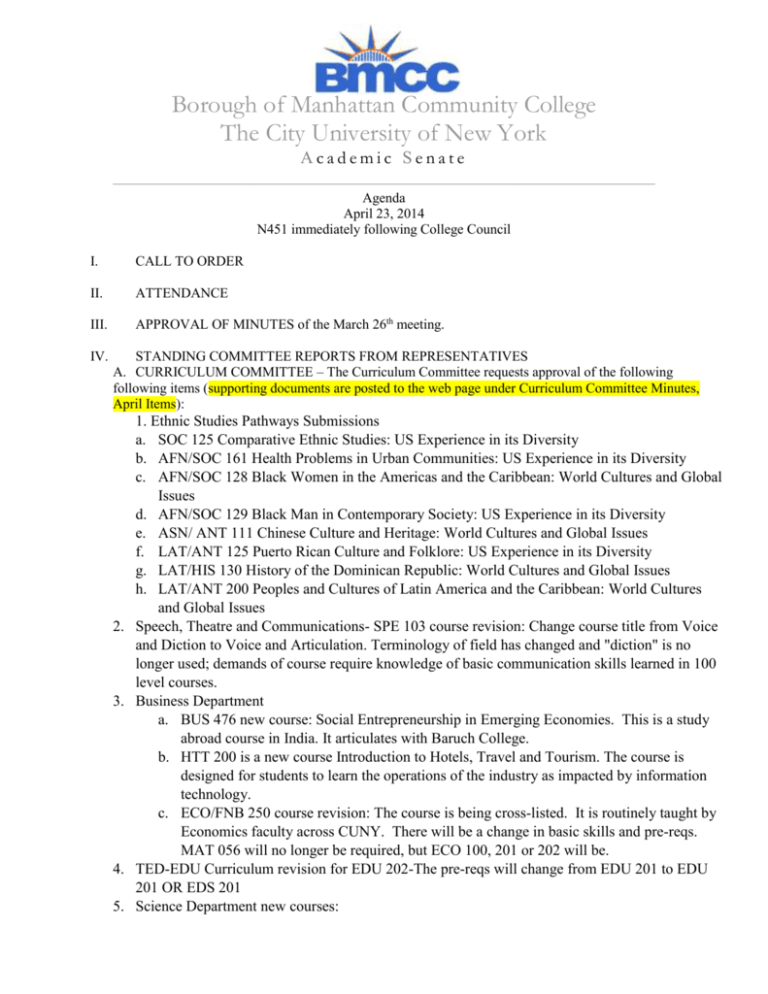
Borough of Manhattan Community College The City University of New York Academic Senate ________________________________________________________________________ Agenda April 23, 2014 N451 immediately following College Council I. CALL TO ORDER II. ATTENDANCE III. APPROVAL OF MINUTES of the March 26th meeting. IV. STANDING COMMITTEE REPORTS FROM REPRESENTATIVES A. CURRICULUM COMMITTEE – The Curriculum Committee requests approval of the following following items (supporting documents are posted to the web page under Curriculum Committee Minutes, April Items): 2. 3. 4. 5. 1. Ethnic Studies Pathways Submissions a. SOC 125 Comparative Ethnic Studies: US Experience in its Diversity b. AFN/SOC 161 Health Problems in Urban Communities: US Experience in its Diversity c. AFN/SOC 128 Black Women in the Americas and the Caribbean: World Cultures and Global Issues d. AFN/SOC 129 Black Man in Contemporary Society: US Experience in its Diversity e. ASN/ ANT 111 Chinese Culture and Heritage: World Cultures and Global Issues f. LAT/ANT 125 Puerto Rican Culture and Folklore: US Experience in its Diversity g. LAT/HIS 130 History of the Dominican Republic: World Cultures and Global Issues h. LAT/ANT 200 Peoples and Cultures of Latin America and the Caribbean: World Cultures and Global Issues Speech, Theatre and Communications- SPE 103 course revision: Change course title from Voice and Diction to Voice and Articulation. Terminology of field has changed and "diction" is no longer used; demands of course require knowledge of basic communication skills learned in 100 level courses. Business Department a. BUS 476 new course: Social Entrepreneurship in Emerging Economies. This is a study abroad course in India. It articulates with Baruch College. b. HTT 200 is a new course Introduction to Hotels, Travel and Tourism. The course is designed for students to learn the operations of the industry as impacted by information technology. c. ECO/FNB 250 course revision: The course is being cross-listed. It is routinely taught by Economics faculty across CUNY. There will be a change in basic skills and pre-reqs. MAT 056 will no longer be required, but ECO 100, 201 or 202 will be. TED-EDU Curriculum revision for EDU 202-The pre-reqs will change from EDU 201 to EDU 201 OR EDS 201 Science Department new courses: a. New Course: ESC 131 Engineering Graphics-Auto CAD. The course provides students with a basic working knowledge of Computer Aided Drafting. 1 Lecture hour and 3 Lab hours (2 credits) b. New Course: BIO 270 Plant Biology. The course is designed to provide fundamentals of plant biology such as anatomy, morphology, growth and development, reproduction, genetics, physiology, plant ecology, and an overview of evolution and the importance of plants in society. 3 Lecture hours, 3 lab hours. (6 credits) 6. Developmental Skills-New Course: LIN 110 The Structure of English. A Modern Languages Concentration requirement and liberal arts elective. The course is designed to provide students with an understanding of grammatical structures and syntax of standard American English allowing them to read, write and interpret texts critically and efficiently. 7. Music and Art-Pathways Submissions a. Art 113 History of Graphic Design: Creative Expression b. Art 221 Pre-Columbian Art of Mesoamerica and the Andes: Creative Expression c. Art 251 Asian Art History: Creative Expression 8. English Department Pathways Submissions and Course Revisions a. ENG 121 English Composition and Introduction to Literature in Tandem: English Composition b. ENG 371 Change in title from English Literature I to British Literature I- This would include literature from all of the British Isles. c. ENG 372 Change in title from English Literature II to British Literature II 9see above d. ENG 384 Change in title from Modern American Theatre to Modern American Drama. “Theatre” generally applies to the study of plays in performance while “Drama” refers to the reading of plays as texts. 9. Modern Language Items a. CHI 440 20th Century Chines Literature and CHI 476 Chinese Heritage: World Cultures and Global Issues b. FRN 476 French Heritage. This is a study-abroad course in Montreal: World Cultures and Global Issues c. SPN 476 Hispanic Heritage. This is a study-abroad course in Spain: World Cultures and Global Issues 10. Social Science Course Revisions and Pathways Submissions a. PSY 240 Developmental Psychology: change in course description to reflect current knowledge in the field and to correspond with courses offered at CUNY senior colleges. b. PSY 250 Child Psychology: change in course description to reflect current knowledge in the field and to correspond with courses offered at CUNY senior colleges. c. PSY 371 Foundations of Black Psychology: change in course description to reflect current knowledge in the field and to correspond with courses offered at CUNY senior colleges. d. CRJ i. 102 change pre-requisite from ‘none’ to ‘CRJ 101’ ii. 202 change pre-requisite from ‘none’ to ‘CRJ 101’ iii. 203 change pre-requisite from ‘none’ to ‘CRJ 101’ iv. 204 course description revision so that it can be in line with courses taught at other CUNY colleges and to change pre-reqs from ‘none’ to ‘CRJ 101’ e. ANT 100 Introduction to Anthropology: World Cultures and Global Issues f. GEO 100 Introduction to Geography: World Cultures and Global Issues g. HIS 120 Early American History: US Experience in its Diversity h. i. j. k. POL 100 American Government: US Experience in its Diversity SOC 100 Introduction to Sociology: Individual and Society ECO 201Macroeconomics: US Experience in its Diversity ECO 151 Caribbean Political Economy: World Cultures and Global Issues B. ACADEMIC FREEDOM a. CUNY Expressive Conduct Policy b. Showing of Revisionaries, May 14th, 2-4 pm C. FACULTY DEVELOPMENT COMMITTEE D. INSTRUCTION COMMITTEE – Technology Survey Results E. ACADEMIC STANDING COMMITTEE E. COMMITTEE ON STUDENT AFFAIRS F. ADMISSIONS COMMITTEE V. CHAIR’S REPORT - Pathways Evaluation (see attached) VI. NEW BUSINESS – a. PMP Changes – Discussion of Possible BMCC PMP Goals (the suggestions below were from the Dept. Chairs): i. Improve advisement – A one-stop shop for financial aid, academic advisement, course substitutions, Graduation advice, and Registration issues. ii. Expand Freshman Orientation - On the use of Degreeworks, financial aid, major and graduation requirements. iii. Increase student awareness of globalization and world cultures: 1) increase the number of sections and of full time faculty in the Center for Ethnic Studies: Asian and Asian American Studies; 2) support tutoring and remediation initiatives for ESL students; 3) provide more faculty development support to all faculty in various areas of knowledge including Seminars on Diversity, pedagogy and technology. iv. Provide more faculty development opportunities - Funding for professional development to keep current with industry. Accountability via some type of certification and a demonstration of use in curriculum development. v. Provide more professional development and mentoring opportunities for Adjunct faculty vi. Increase tutoring and SI support for ESL/second language students in first year courses (e.g., ENG 101, SOC 100, PSY 100 (other Social Science courses), BUS 100, ACC 100, SPE 100 or 102, etc.) and for entering International Students. vii. Increase WAC funding for WI training seminars, refresher workshops, books and materials. viii. Increase Reading across the curriculum (RAC) seminars and/or mentoring ix. Improve Space Management VII. OLD BUSINESS VIII. ADJOURNMENT PATHWAYS Evaluation Meeting, February 13, 2014 (Delgado, Glaser, Wong) Plan: IR will identify several years of baseline levels for the indicators below. Indicators will be updated annually in an “interrupted time series” longitudinal design. Indicators: For transferring graduates… o The numbers of students who transfer after graduation, by CC program, entering program, and entering college. o The numbers of credits that are accepted, on average, by CC program, entering program, and entering college. For those who transfer before graduation… o The number who transfer before receiving an associate degree o The number of pathways credits completed by program o The number of remedial credits completed by program o The numbers of credits that are successfully accepted, on average, by CC program, entering program, and entering college Implementation of Pathways courses o Which courses are most often cancelled o Which courses are most often completed o The pass rates for the Pathways courses CONTEXT: Indicators from the Wrigley article: Improving Student Transfer at CUNY o “In Fall 2009, 70.1% of students who transferred from associate programs inside or outside of CUNY did so without associate degrees. Of those transferring from CUNY associate programs, 67.6% transferred without degrees” o Reasons for early transfer: finished remediation, fear that credits won’t transfer, students want the proper preparation for the 4-year major o Number of students with AAS degrees (terminal) who still transfer and must make up general education credits o “In 2009-10, Baruch designated 32.5% of the courses it evaluated to be not transferable, while Queens designated only 9.5% as such.” o “In 2009-10, community colleges designated almost 40% of the CUNY courses they evaluated as non-transferable” from CUNY students trying to transfer in to the CC. There were no matches for the upper division courses taken. o Elective credits vs. “electives within the major” o Accepted credits as a proportion of accumulated credits, graduates vs non-graduate transfers o Delays in having transfer credits evaluated (Baruch requires one or two semesters) o Senior colleges requiring that CC students repeat courses in the major o “Excess credits” beyond those required to graduate
